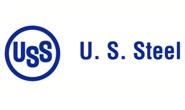Market Segment

July 28, 2016
US Steel Narrows Losses, Pleased With Trade Case Results
Written by Sandy Williams
US Steel narrowed its losses in second quarter, reporting a net loss of $46 million compared to a loss of $340 million in first quarter, and $261 million in Q2 2016. Net sales for the company totaled $2.58 billion.
Earnings for the flat rolled and US Steel Europe segments returned to positive numbers at $6 million and $55 million, respectively. The tubular business posted a loss of $78 million compared to a loss of $64 million in first quarter.
US Steel President and Chief Executive Officer Mario Longhi said, “Our second quarter results improved significantly from the first quarter as our European segment posted its best results since the third quarter of 2008 and our Flat-Rolled segment returned to profitability. Our improving cost structure continues to drive increases in our margins and the recent increases in steel prices started to be reflected in our results.”
Flat rolled shipments totaled 2,692,000 tons in second quarter, up from 2,498,000 tons in first quarter. The average realized price per ton was $642 for flat-rolled steel. Flat-rolled production was down slightly from first quarter at 2,734,000 tons and at a capacity utilization rate of 65 percent compared to 66 percent in Q1 and 58 percent in Q2 2015. Of note was the full out capacity of the US Steel Europe segment at 101 percent in second quarter. (US Steel bases utilization rates on annual raw steel production capability of 17 million tons for flat-rolled and 5 million net tons for US Steel Europe.)
Lead times for hot rolled coil products are currently over six weeks and cold-rolled and galvanized coil products are over nine weeks.
A blast furnace outage is planned in fourth quarter for Great Lakes Works that will last 25 days.
In the outlook remarks for 2016 Longhi said, “While we began to realize some benefit from recent price increases in the second quarter, we will see better average realized prices, primarily in our Flat-Rolled and European segments, in the second half of the year. The steel industry continues to face challenging conditions as a result of global overcapacity and unfair trade practices. We remain focused on improving our trade laws and their enforcement, and we are encouraged that final affirmative determinations in recent trade cases have been a catalyst for increasing steel prices.
During the earnings conference call the US Steel executives received questions about the restarting Granite City and construction of the EAF at Fairfield. Granite City will remain idled until markets substantially and solidly evolve, said Longhi.
Regarding market conditions for oil and gas, Longhi expects nothing meaningful to happen throughout the rest of this year. “What it shows is, probably we’ve hit bottom. Inventories in total are still very high… So, I think we’re going to have to wait through next year and see what happens. Geopolitical forces in North America will still have the volatile environment, and the political environment and we don’t know how the Fed is going to act. So, there are so many things up in the air that people are still going to be cautious as to how they bring more capacity to life.”
The Fairfield EAF was put on hold in Dec. 2015 due to challenging conditions in the energy industries. If the oil and gas markets should turn around, bringing drilling rigs back online, a decision could be made to resume construction of the EAF. Completion of the project would take approximately 14 months.
US Steel executives fielded several questions about trade during the conference call.
Commenting on the recent Commerce trade cases determinations, Longhi said, “Well, we certainly are pleased with the outcomes that we’ve seen so far. And that’s proof that the level-playing field is being established. And under those conditions, the industry should be able to benefit from everything that we do that’s really good, but it gets undermined when the level-playing field is not leveled.”
In regards to the 337 action, Longhi said, “The Section 337 had a little bit of a technicality, but I think it’s being overcome, and we should see a continuation of the process going forward in earnest very, very soon. The ITC and the Department of Commerce are very supportive of our position. So, nothing in our view has changed, and we do have very high expectations that this is going to be a positive for the industry as a whole, not just for us.”
Dave Burritt, CFO and executive vice president said, “The Section 337 case is about addressing not only the transshipments, but there is fraud in it. There is collusion. And we cannot allow for those countries to continue to operate in that way to the detriment of U.S. companies.”
“It’s really strong case,” he added. “I think we will prevail in that matter. But coming out of the trade cases, you look at the margins that are being determined out there. And if you just like at the prices they’ve been quoting. You put those margins on it; it determines what the real honest price should be. Not the fraudulent prices they have been practiced before. So, if you just look at that, you’re going to see what fairness of the market should be. And that’s what we’re beginning to see happen.”
US Steel was asked to comment on how the hot-rolled case will affect exports from Korea that arrive through US Steel’s joint venture with POSCO. Longhi said that although the final determination “should flow across every single business in the United States” US Steel has the capacity available to continue to supply the JV.







